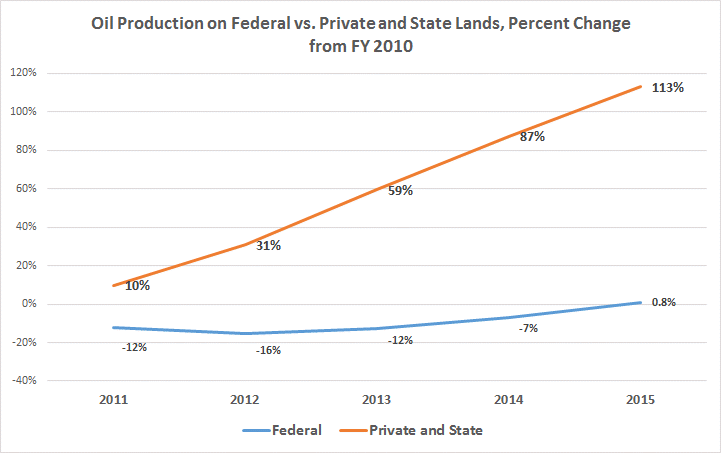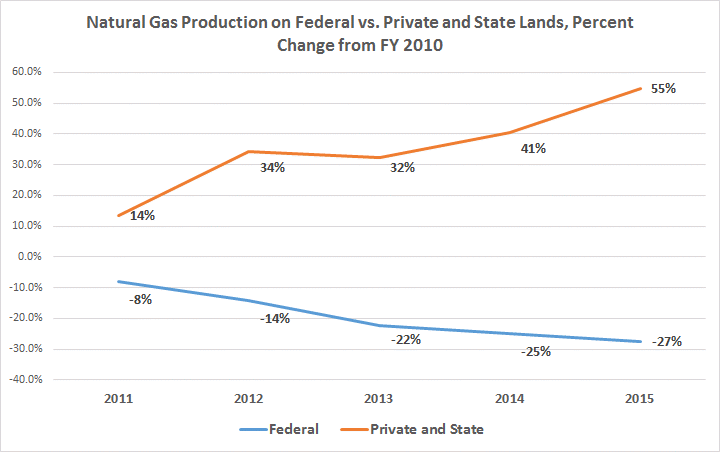In a speech earlier this week at the Detroit Economic Club, Republican presidential candidate Donald Trump emphasized that lifting burdensome and unnecessary restrictions on energy production would lead to a stronger economy and a more prosperous society. Citing an IER study, Trump laid out the benefits of opening up federal lands for energy exploration. IER’s study, conducted by Dr. Joseph Mason of Louisiana State University, found that opening up federal lands would:
- Increase GDP by more than $100 billion dollars annually, add over 500,000 new jobs annually, and increase annual wages by more than $30 billion dollars over the next 7 years;
- Increase federal, state, and local tax revenues by almost $6 trillion dollars over 40 years;
- Increase total economic activity by more than $20 trillion dollars over the next 40 years.
Trump previously cited these numbers in a speech he gave at the Williston Basin Petroleum Conference back in May as well as in his speech at the Republican National Convention.
Critics resort to ad hominem attacks
Some in the media and public policy world have criticized the study’s findings, but these critics have offered no substantive critiques of the numbers or techniques use to generate them. Instead, these attacked rely on rhetorical and ad hominem attacks.
For instance in a New York Times article from May, Dr. David Victor of the University of California San Diego stated the following about IER’s study, “That strikes me as fantasy. The numbers seem off by an order of magnitude.”
Dr. Victor’s statement was repeated in a Vox article fact checking Donald Trump’s convention speech.
Not only is this not a substantive rebuttal to the study, but it’s clear from his comments that Dr. Victor didn’t take the time to actually review the study. It’s unclear, however, why Dr. Victor was sought out as an expert on this matter in the first place. According to his biography, Dr. Victor is a professor of international relations and director of the Laboratory on International Law and Regulation and has no economic modeling expertise or experience in the field of oil and gas economics.
At IER, we’re in favor of having an open and honest debate on the facts, but without Dr. Victor’s making a substantive critique of the study, it’s impossible to have that debate.
Similarly, Ben Adler of Grist (a blog of sorts that claims to be “a source of intelligent, irreverent environmental news…”) called the numbers “ridiculous” and said that Trump “might as well have pulled it out of thin air.” Again, this is not a substantive critique.
The numbers were generated by well-established economic modeling techniques, including data from the Congressional Budget Office, the Bureau of Economic Analysis, and the Department of Commerce’s Regional Input-Output Modelling System II. The study was conducted by Dr. Joseph Mason, a professor at Louisiana State University and a Senior Fellow at the Wharton School of Business at the University of Pennsylvania. Of course, missing from Adler’s smear was any substantive rebuttal to the IER study.
Lastly, following Trump’s most recent speech in Detroit, former Obama adviser David Axelrod tweeted:
.@realDonaldTrump cites energy analysis from The Institute for Energy Research, notorious as the climate change-denying arm of oil industry.
— David Axelrod (@davidaxelrod) August 8, 2016
Again, Axelrod’s ad hominem attack was not based in fact or reason. Instead he attempted to discredit the study and the organization by calling IER a “climate change-denying arm of oil industry.”
If Mr. Axelrod took a moment to look at IER’s body of work, he would find that we focus on promoting free-market energy policies because we recognize that affordable, reliable energy is a key to a prosperous society. When IER does comment on climate change, we use models provided by either the Environmental Protection Agency (EPA) or the Intergovernmental Panel on Climate Change (IPCC). Does Mr. Axelrod also consider the EPA and the IPCC to be climate change-denying arms of the oil industry? Obviously Mr. Axelrod isn’t concerned about the truth or reality—only trying to score political points.
Why IER’s study matters
Under the Obama administration, much of America’s federal lands and waters have been held under lock and key. As a result, production in these areas has lagged far behind production on non-federal lands, which have experienced a boom in production in recent years.
From 2010-2015 oil production on non-federal lands has increased by an astounding 113 percent, while oil production on federal lands has increased by a measly 0.8 percent over the same time period.

Similarly, from 2010-2015 natural gas production on non-federal lands has increased by 55 percent, while natural gas production on federal lands has decreased by 27 percent.

The discrepancy between non-federal and federal lands is largely due to the Obama administration’s policies, which include a drop in lease sales and longer permitting times. On average it takes the administration 220 days to process a permit to drill.[i] For comparison, in some states it takes just 10 business days to approve a permit.
Given this reality, it’s important to look at the economic benefits the Obama administration are forgoing with its keep-it-in-the-ground policies, which is what IER’s study on the benefits of opening federal lands to energy production shows. Lifting unnecessary restrictions on energy exploration on federal lands would significantly boost the economy by creating millions of job opportunities for future generations, raising wages, generating trillions of dollars in revenue and overall economic activity.
Conclusion
IER’s study on opening federal lands to energy exploration is a well-researched and much needed analysis showing the economic potential of tapping into America’s most abundant energy resources. The study uses well-regarded economic modelling techniques, but instead of critiquing the actual data, modelling, or the Department of Commerce’s Regional Input-Output Modelling System II, the detractors avoid any substantive criticism.
Despite several attempts to smear the study and IER in the press and on social media, critics of the study have yet to refute the numbers or offer a substantive rebuttal. IER welcomes an honest, factual discussion about our study. We await a substantive debate instead of the ad hominem and baseless attacks we have seen so far from David Victor, Ben Adler, David Axelrod, and others.
[i] Bureau of Land Management, Average Application for Permit to Drill (APD) Approval Timeframes: FY2005 – FY2015, http://www.blm.gov/wo/st/en/prog/energy/oil_and_gas/statistics/apd_chart.html
The post Lacking Substance, Axelrod et al. Resort to Petty Insults; Fail to Counter IER Study appeared first on IER.
No comments:
Post a Comment